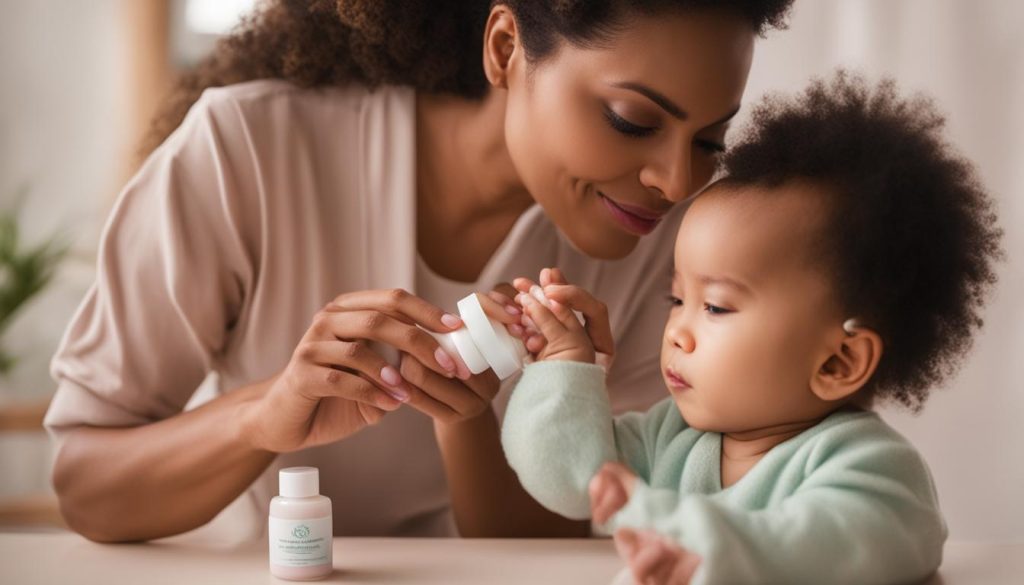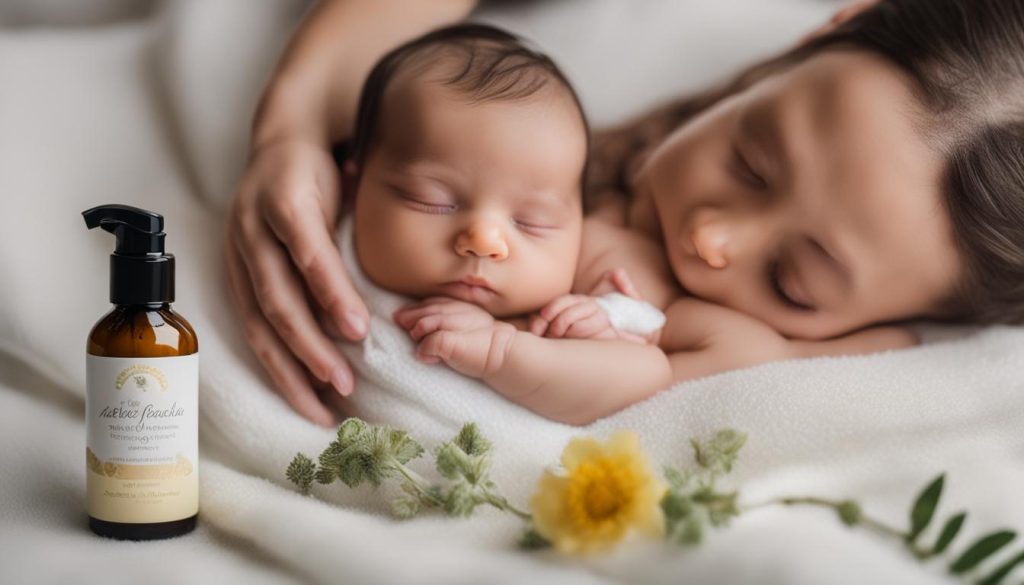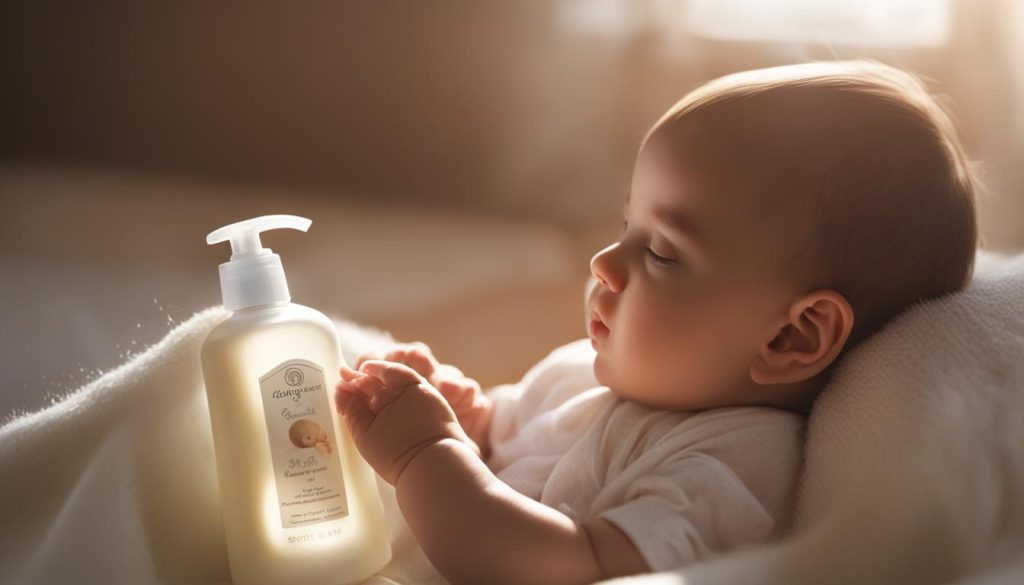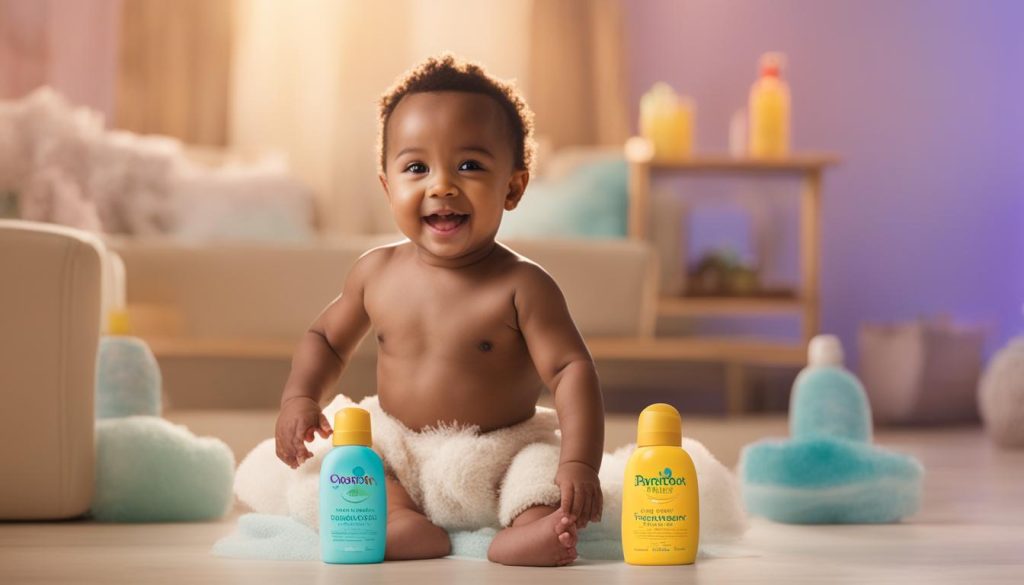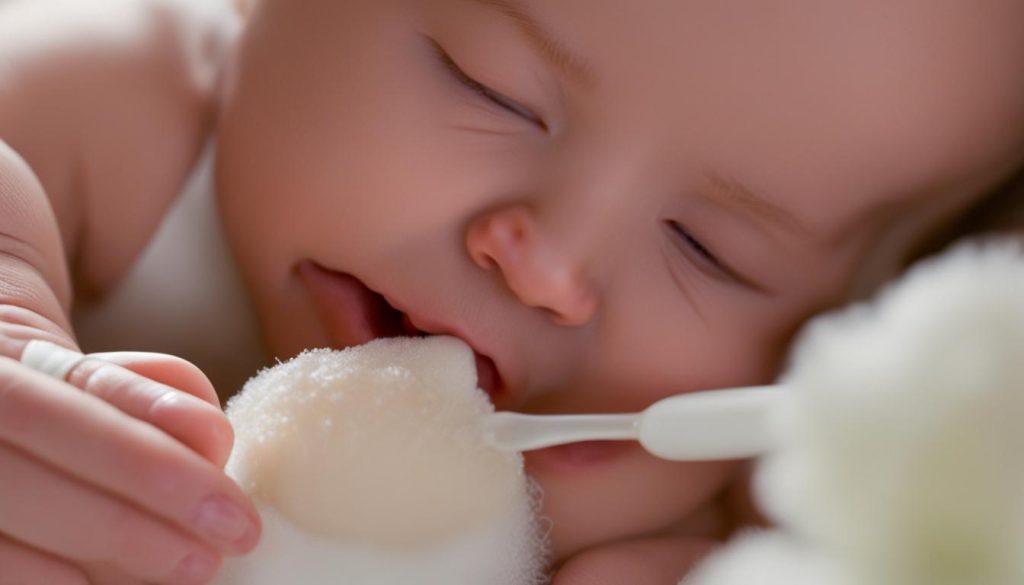When it comes to skincare, we often overlook the potential benefits of baby products for adults. One such product is baby lotion, which is known for its gentle and hypoallergenic nature. But is baby lotion good for your face? Let’s explore the benefits of using baby lotion on the face and why it can be a viable option for adult skincare.
Baby lotion is formulated to be ultra gentle and fragrance-free, making it suitable for sensitive skin. It can provide much-needed hydration and moisturization for individuals with dry skin or specific skin issues like eczema. While some baby lotions may not be non-comedogenic and can potentially clog pores, they can still be used as an alternative to regular facial moisturizers.
Using baby lotion on the face can have several potential benefits. Baby lotions are often moisturizing and can leave the skin feeling soft and smooth. They can also help soothe and calm irritated skin, making them beneficial for those with conditions like eczema.
Experts recommend using fragrance-free and hypoallergenic baby lotion for adults with sensitive skin or specific skin concerns. Patch-testing on a small area of the face can help determine if the lotion is compatible with your skin. Ultimately, whether baby lotion is good for your face depends on your individual preferences and needs.
What Makes Baby Lotion Different from Regular Moisturizers?
Baby lotion and regular moisturizers have some key differences in their formulation and intended use. Understanding these differences can help you make an informed decision about which product is best for your skincare needs.
One of the main distinctions between baby lotion and regular moisturizers is the targeted audience. Baby lotions are specifically formulated for the delicate skin of infants, whereas regular moisturizers are designed for adult skin. This means that baby lotions tend to be ultra gentle and hypoallergenic, making them suitable for sensitive skin.
In terms of ingredients, baby lotions often contain nourishing and soothing components like aloe vera, sunflower oil, and coconut oil. These natural ingredients help to increase moisture and reduce irritation on baby’s skin. Regular moisturizers, on the other hand, may have a wider range of active ingredients that target specific skincare concerns in adults, such as anti-aging or acne prevention.
It’s important to note that while baby lotions can be used by adults, not all baby lotions are non-comedogenic, meaning they may potentially clog pores. For individuals with sensitive or acne-prone skin, it is recommended to choose a fragrance-free and hypoallergenic baby lotion that is suitable for facial use. Patch-testing a small area of your face can also help determine if a particular baby lotion is compatible with your skin.
Overall, the choice between baby lotion and regular moisturizers depends on your individual skin type, preferences, and specific skincare needs. Some individuals find that baby lotion works well for their skincare routine, while others prefer dedicated facial moisturizers. Consulting with a dermatologist or skincare professional can provide personalized recommendations for your specific skin concerns.
| Comparison of Baby Lotion and Regular Moisturizers | Baby Lotion | Regular Moisturizer |
|---|---|---|
| Target Audience | Specifically formulated for infants | Designed for adults |
| Ingredients | Gentle and nourishing ingredients like aloe vera, sunflower oil, and coconut oil | Wide range of active ingredients targeting specific skincare concerns |
| Non-Comedogenic | Not all baby lotions are non-comedogenic; choose fragrance-free and hypoallergenic options for facial use | May have non-comedogenic options to prevent clogged pores |
| Usage | Gentle moisturization suitable for sensitive skin | Specific skincare concerns like anti-aging or acne prevention |
Table: Comparison of Baby Lotion and Regular Moisturizers
Myths and Facts about Using Baby Lotion on Your Face
When it comes to using baby lotion on the face, there are several common myths and misconceptions that often circulate. Let’s explore some of these myths and separate them from the facts to help you make an informed decision.
Myth: Using baby lotion on the face is not safe or effective.
Fact: The safety and effectiveness of using baby lotion on the face can vary depending on individual skin type and preferences. While some may find it works well for their skincare routine, others may prefer dedicated facial moisturizers. It is important to choose a fragrance-free and hypoallergenic baby lotion that is suitable for sensitive skin. Patch-testing on a small area of the face can help determine if the lotion is compatible with your skin.
Myth: Baby lotion on the face can clog pores and cause breakouts.
Fact: While some baby lotions may not be non-comedogenic and can potentially clog pores, there are fragrance-free and hypoallergenic options available. These gentle formulations can be suitable for adults with sensitive skin or specific skin issues like eczema. It is crucial to choose the right baby lotion for your skin type and ensure it does not contain any ingredients that may cause irritation or breakouts.
Myth: Baby lotion is not meant for adult facial skincare.
Fact: While baby lotions are formulated for babies, they can still be used by adults as an alternative to regular facial moisturizers. Many baby lotions are gentle, fragrance-free, and moisturize the skin effectively. They can provide hydration and nourishment to the facial skin, leaving it feeling soft and smooth. It is important to choose a baby lotion that is suitable for facial use and compatible with your skin type.
Myth: Baby lotion is not effective for addressing specific skin concerns.
Fact: Baby lotions can be beneficial for individuals with sensitive or dry facial skin. They can help hydrate and moisturize the skin, which can be particularly beneficial for conditions like dryness and eczema. While they may not have specific ingredients targeted towards specific skin concerns, they can still provide gentle care and nourishment to the facial skin. If you have specific skin concerns, it may be best to consult with a dermatologist or skincare professional for personalized recommendations.
| Myth | Fact |
|---|---|
| Using baby lotion on the face is not safe or effective. | The safety and effectiveness can vary depending on individual skin type and preferences. Patch-testing can help determine compatibility. |
| Baby lotion on the face can clog pores and cause breakouts. | Choosing fragrance-free and hypoallergenic options can prevent clogged pores and breakouts. |
| Baby lotion is not meant for adult facial skincare. | Adults can use baby lotion as an alternative to regular facial moisturizers. |
| Baby lotion is not effective for addressing specific skin concerns. | While not targeted for specific concerns, baby lotions can still provide gentle care and nourishment. |
It is important to remember that what works for one person may not work for another. Each individual’s skin is unique, and it may take some experimentation to find the right skincare products that suit your needs. If you have any concerns or questions, it is always best to consult with a dermatologist or skincare professional for personalized guidance.
Benefits of Using Baby Lotion on Your Face
Using baby lotion on the face can offer several advantages for facial skincare. Baby lotions are known for their gentle and moisturizing properties, making them suitable for individuals with sensitive or dry skin. The use of baby lotion can provide hydration and nourishment to the facial skin, leaving it feeling soft and smooth.
One of the key benefits of using baby lotion on the face is its ability to soothe and calm irritated skin. With its hypoallergenic formulation, baby lotion can help alleviate discomfort and redness, making it beneficial for individuals with conditions like eczema.
Moreover, using baby lotion on the face can be a cost-effective alternative to dedicated facial moisturizers. Baby lotions are often more affordable than specialized skincare products, making them a budget-friendly option for those looking to maintain healthy and moisturized facial skin.
To gain the full benefits of using baby lotion on the face, it is important to choose a fragrance-free and hypoallergenic formulation that is specifically labeled for facial use. Patch-testing on a small area of the face can help determine compatibility with individual skin. Consulting with a dermatologist or skincare professional can provide personalized recommendations based on specific skin concerns.
| Advantages of Using Baby Lotion on Your Face: |
|---|
| Offers gentle and moisturizing properties suitable for sensitive or dry skin |
| Soothes and calms irritated skin, making it beneficial for conditions like eczema |
| Cost-effective alternative to dedicated facial moisturizers |
Baby Lotion vs. Face Moisturizer: Which is Better?
When it comes to choosing between baby lotion and face moisturizer for your skincare routine, there are a few factors to consider. Baby lotions are often gentle and moisturizing, making them suitable for individuals with sensitive or dry skin. However, it’s important to note that some baby lotions may not be non-comedogenic and can potentially clog pores. On the other hand, dedicated face moisturizers are specifically formulated for facial skincare and may offer a wider range of active ingredients targeted towards specific skin concerns.
So, which option is better? The answer ultimately depends on your individual preferences, skin type, and needs. If you have sensitive or dry facial skin and are looking for a gentle and moisturizing option, using a fragrance-free and hypoallergenic baby lotion may be beneficial. Baby lotions can provide hydration and nourishment to the skin, leaving it feeling soft and smooth. However, if you have specific skin concerns or are looking for more targeted skincare solutions, a dedicated face moisturizer may be a better choice.
When making your decision, it’s important to consult with dermatologists or skincare professionals who can provide personalized recommendations based on your skin type and concerns. They can help guide you towards the best product for your specific needs, whether it’s a baby lotion or a face moisturizer. Additionally, patch-testing the lotion on a small area of your face can help determine its compatibility with your skin and prevent any potential allergic reactions or irritation.
| Factor | Baby Lotion | Face Moisturizer |
|---|---|---|
| Gentleness | ✓ | ✓ |
| Moisturizing | ✓ | ✓ |
| Non-Comedogenic | ✗ | Varies (check product labels) |
| Targeted Active Ingredients | Varies (often limited) | ✓ |
| Skin Type Compatibility | Varies (check product labels) | ✓ |
In summary, whether you choose to use baby lotion or face moisturizer on your face depends on your personal preferences, skin type, and skincare needs. Baby lotions can be gentle and moisturizing, but they may not always be non-comedogenic. Face moisturizers, on the other hand, offer a wider range of targeted active ingredients. Consulting with skincare experts and patch-testing can help you make an informed decision and find the best product for your facial skincare routine.
Using Baby Lotion on Sensitive Facial Skin
When it comes to caring for sensitive facial skin, using baby lotion can offer numerous benefits. Baby lotions are formulated to be gentle and hypoallergenic, making them ideal for individuals with sensitive skin. The fragrance-free nature of baby lotions reduces the risk of irritation or allergic reactions, making them a safe choice for facial use.
Baby lotions provide gentle hydration and moisturization, which can help soothe and calm sensitive facial skin. Their mild and nourishing ingredients can replenish moisture levels, leaving the skin feeling soft, smooth, and rejuvenated. Pediatric experts often recommend fragrance-free and hypoallergenic baby lotions for individuals with sensitive skin, ensuring that the product is specifically labeled for sensitive skin or for addressing skin conditions such as eczema.
It is important to patch-test baby lotion on a small area of the face to ensure compatibility with individual skin. This step helps to determine if the lotion will effectively moisturize and hydrate the skin without causing any adverse reactions. Consulting with a dermatologist or skincare professional can provide personalized recommendations based on an individual’s specific skin concerns.
Benefits of Baby Lotion for Sensitive Skin
Using baby lotion on sensitive facial skin can offer several key benefits. The gentle formulation of baby lotions ensures that they do not contain harsh chemicals or potential irritants, reducing the risk of skin reactions. The mild and hypoallergenic nature of baby lotions makes them suitable for daily use, providing long-lasting hydration and nourishment to the skin.
“Baby lotions are often recommended for individuals with sensitive skin, including on the face. They are typically fragrance-free and hypoallergenic, making them suitable for sensitive facial skin.” – Pediatric Expert
Baby lotions can help restore and maintain the natural moisture balance of sensitive facial skin. They act as a protective barrier, shielding the skin from environmental aggressors and preventing moisture loss. The soothing properties of baby lotions can help alleviate redness, dryness, and irritation, providing relief for individuals with sensitive skin conditions.
Table: Comparison of Baby Lotions for Sensitive Facial Skin
| Brand | Key Features | Suitable for Sensitive Skin | Recommended for Specific Skin Conditions |
|---|---|---|---|
| Brand A | Fragrance-free, hypoallergenic | Yes | Yes (eczema) |
| Brand B | Gentle and nourishing | Yes | No |
| Brand C | Contains natural ingredients | Yes | Yes (sensitive skin) |
When choosing a baby lotion for sensitive facial skin, it is crucial to consider specific requirements and preferences. Reading labels and comparing various brands can help identify fragrance-free and hypoallergenic options suitable for facial use. Additionally, seeking recommendations from dermatologists or skincare professionals can provide valuable insights into selecting the right baby lotion for individual needs.
Using Baby Lotion for Facial Moisturization
When it comes to facial care, baby lotion can be a viable option for moisturization. Baby lotions are known for their gentle and moisturizing properties, making them suitable for individuals with dry or sensitive facial skin. Applying baby lotion to the face after cleansing and toning can help maintain the skin’s moisture balance, leaving it feeling soft, hydrated, and nourished.
One of the benefits of using baby lotion on the face is its ability to provide gentle hydration without causing irritation. Baby lotions are often formulated to be fragrance-free and hypoallergenic, making them less likely to trigger adverse reactions in individuals with sensitive skin. These lotions can help soothe and calm the skin, which can be particularly beneficial for those with conditions like eczema.
To ensure optimal results, it is important to choose a baby lotion that is suitable for facial use and compatible with your skin type. Look for fragrance-free and hypoallergenic options specifically labeled for facial use. Patch-testing on a small area of the face can help determine if the lotion is well-tolerated by your skin. Additionally, consulting with a dermatologist or skincare professional can provide personalized recommendations based on your specific skin concerns.
| Benefits of Using Baby Lotion on the Face |
|---|
| Provides gentle hydration and moisturization |
| Soothes and calms irritated skin |
| Leaves the skin feeling soft and hydrated |
| Can be cost-effective compared to dedicated facial moisturizers |
Using baby lotion for facial moisturization is a personal choice that depends on individual preferences and needs. While some individuals may find baby lotion to be a suitable and effective option for their skincare routine, others may prefer dedicated facial moisturizers. It is crucial to consider your skin type, patch-test the lotion, and consult with a skincare professional before incorporating baby lotion into your facial care routine.
Expert Opinions on Using Baby Lotion on the Face
When it comes to using baby lotion on the face, there are varying opinions among experts. Pediatricians and dermatologists have different perspectives on the safety and effectiveness of applying baby lotion to the facial skin. Some experts recommend fragrance-free and hypoallergenic baby lotion for individuals with sensitive or dry skin, as it can provide gentle hydration and soothe irritation. However, it is important to note that not all baby lotions are created equal, and some may not be non-comedogenic, potentially clogging pores and causing breakouts.
Parents should consider the specific needs and preferences of their own skin when deciding whether to use baby lotion on their face. Patch-testing a small area of the face can help determine if a specific baby lotion is compatible with individual skin. Consulting with a dermatologist or skincare professional is also beneficial, as they can provide personalized recommendations based on skin type and concerns.
Expert Quote: “While fragrance-free and hypoallergenic baby lotions can be safe and gentle for facial use, it’s important to choose the right product for your skin type. Patch-testing is key to ensure compatibility, and consulting with a dermatologist can provide valuable insights specific to your skincare needs.” – Dr. Jessica Kim, Dermatologist
| Expert Opinions on Using Baby Lotion on the Face | Recommendation |
|---|---|
| Fragrance-free and hypoallergenic baby lotions can provide gentle hydration and soothe irritation for sensitive or dry facial skin. | Consider using baby lotion on the face, but patch-test and choose a suitable product for individual skin type. |
| Not all baby lotions are non-comedogenic, and some may potentially clog pores and cause breakouts. | Be cautious when using baby lotion on the face, and choose a lotion that is compatible with individual skin. |
| Consulting with a dermatologist or skincare professional can provide personalized recommendations for facial skincare. | Seek professional advice for expert opinions tailored to individual skin concerns. |
Ultimately, the decision to use baby lotion on the face is a personal one. While some individuals may find that baby lotion works well for their skincare routine, others may prefer dedicated facial moisturizers. It is important to listen to your skin’s needs and choose products that are suitable and compatible, taking into account expert opinions and recommendations.
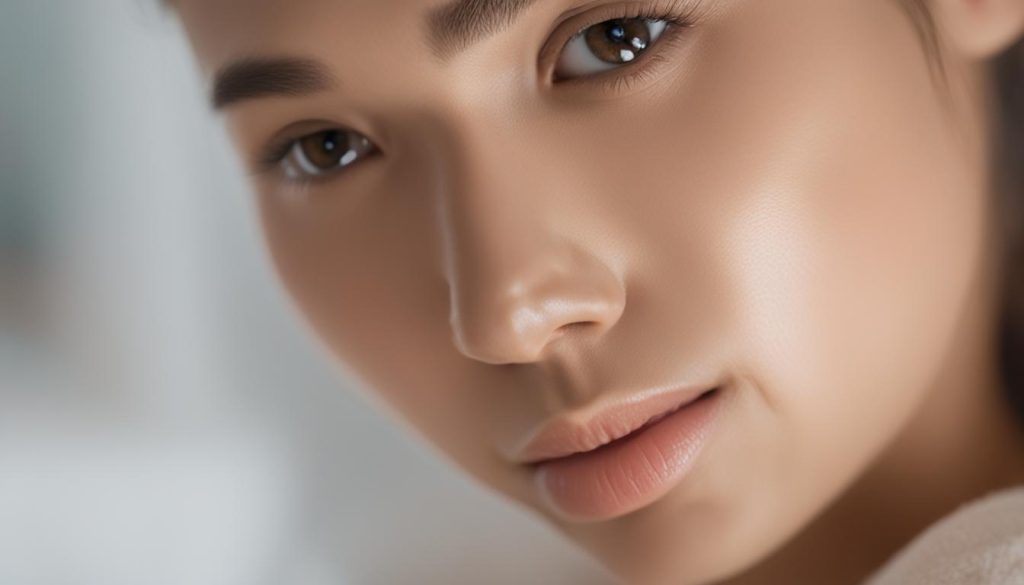
References:
- Garcia, L. (2020). Baby Lotion for Face: Safe or Not? Healthline. Retrieved from https://www.healthline.com/health/baby-lotion-for-face
- McGrath, A. (2021). The Truth About Baby Lotion & Your Face. The Klog. Retrieved from https://theklog.co/baby-lotion/
Brand Comparison: Choosing the Right Baby Lotion for Your Face
When it comes to choosing a baby lotion for your face, there are several factors to consider. Different brands offer various formulations and ingredients, making it essential to compare options and find the best fit for your skin type and concerns.
Table: Top Baby Lotion Brands for Facial Use
| Brand | Key Features | Suitable Skin Types | Recommended for |
|---|---|---|---|
| Brand A | Gentle, fragrance-free | Sensitive, dry skin | Individuals with eczema |
| Brand B | Hypoallergenic, moisturizing | All skin types | Everyday facial moisturization |
| Brand C | Extra-gentle, soothing | Combination, sensitive skin | Calming irritated facial skin |
When comparing brands, consider your skin type and any specific concerns you may have, such as eczema or dryness. Look for fragrance-free and hypoallergenic options that are suitable for facial use. Reading reviews and recommendations from dermatologists or skincare experts can also provide valuable insights into the effectiveness of different baby lotion brands.
Ultimately, the choice of baby lotion brand for facial use is a personal one. Experimenting with different brands and formulations can help you find the one that works best for your skin. Consult with a skincare professional for personalized recommendations based on your specific needs and concerns.
Conclusion: Is Baby Lotion Good for Your Face?
After examining the benefits, differences, and expert opinions surrounding the use of baby lotion on the face, it is clear that this skincare practice can be a viable option for some individuals. Baby lotions, with their gentle and moisturizing properties, can effectively hydrate and nourish sensitive or dry facial skin. They can leave the skin feeling soft, smooth, and soothed.
However, it is important to choose the right baby lotion for facial use. Opt for fragrance-free and hypoallergenic options that are specifically formulated for sensitive skin. Patch-testing on a small area of the face can help determine compatibility before full application. Consulting with a dermatologist or skincare professional can provide personalized recommendations based on your unique skin concerns.
Ultimately, whether or not to use baby lotion on your face is a personal decision. Some individuals may find it to be a cost-effective alternative to dedicated facial moisturizers, while others may prefer the targeted benefits offered by specialized products. Consider your skin type, preferences, and needs to determine if incorporating baby lotion into your skincare routine is beneficial for you.
FAQ
Is it safe to use baby lotion on your face?
Yes, it is generally safe to use baby lotion on your face. However, it is important to choose a fragrance-free and hypoallergenic baby lotion that is suitable for sensitive skin.
Can I use baby lotion on my face if I have sensitive skin?
Yes, baby lotion can be beneficial for individuals with sensitive facial skin. Look for fragrance-free and hypoallergenic baby lotions that are specifically labeled for sensitive skin.
What are the benefits of using baby lotion on your face?
Baby lotion can provide gentle hydration and moisturization to the facial skin, leaving it soft and smooth. It can also soothe and calm irritated skin, making it beneficial for conditions like eczema.
How is baby lotion different from regular moisturizers?
Baby lotions are formulated to be ultra gentle and fragrance-free, specifically for the delicate skin of babies. They may not be non-comedogenic and can potentially clog pores, but they can still be used as an alternative to regular facial moisturizers.
What do experts say about using baby lotion on the face?
Pediatric experts and dermatologists have different opinions on using baby lotion on the face. Some recommend fragrance-free and hypoallergenic baby lotion for individuals with sensitive or dry facial skin, while others may advise against it due to potential skin reactions.
Which is better, baby lotion or face moisturizer?
The choice between baby lotion and face moisturizer depends on individual preferences and needs. Baby lotions can be gentle and moisturizing, but face moisturizers are formulated specifically for facial skincare and may have a wider range of active ingredients for specific skin concerns.
How do I choose the right baby lotion for my face?
When choosing a baby lotion for facial use, consider your skin type, specific skin issues, and read labels to compare options. Look for fragrance-free and hypoallergenic baby lotions suitable for facial use or recommended for sensitive skin.
What do experts say about using baby lotion on sensitive facial skin?
Pediatric experts and dermatologists generally recommend fragrance-free and hypoallergenic baby lotion for individuals with sensitive facial skin. These baby lotions are formulated to be gentle and moisturizing without causing irritation or allergic reactions.
Can I use baby lotion on my face for moisturization?
Yes, baby lotion can be used for facial moisturization. Apply it to the face after cleansing and toning as a regular moisturizer. Choose a fragrance-free and hypoallergenic baby lotion suitable for facial use and compatible with your skin type.
What are some expert opinions on using baby lotion on the face?
Expert opinions on using baby lotion on the face vary. Some experts recommend fragrance-free and hypoallergenic baby lotion for individuals with sensitive or dry facial skin, while others may advise against it due to potential clogged pores or other skin reactions. Consulting with a dermatologist or skincare professional can provide personalized recommendations.

